Reviews
Review: Football Manager 2012
November 26, 2011, Author: Phil Ubee
Football Manager is now in its eighth year since Sports Interactive split with Eidos and teamed up with Sega, but as all fans know the genes of the series derive from the original Championship Manager title way back in 1992. In whatever form it’s taken, it has been widely regarded as the most in-depth management Sim for a very long time.
Like many of us football fans, I have spent a few long nights with various versions of both the original and subsequent Championship Manager, and more recently the Football Manager Series, desperately wanting to get in “one last game”, which soon becomes “just finish the season”, before ultimately leading to “I’ll just go through the free agents and my short list to get the squad sorted for next year…”.
Naturally, all this meant that when a review copy of the recently released Football Manager 2012 arrived at TIMJ I was very quick to raise my hand, don my Parker and take to the training pitch in a bid to lead my country to World Cup glory (via multiple promotions a few Champions League titles and the odd run-in with a virtual Ken Bates style chairman).
Can Football Manager 2012 make all my dreams come true, or is it destined for a life scratching around the lower leagues before seeing out its days in the Isthmian League?
Leading from the front
For those of you who have never experienced a Football Management game, I strongly recommend you check out Matt’s recent editorial to fully understand the addictiveness of this kind of title. Football Manager 2012 remains true to its predecessors in giving you the opportunity to take the top job at pretty much any football club on earth. The game then focuses on you, the gaffer, as you look to get the right balance of Youth and Experience, Show Pony and Water Carrier, and Attack and Defence, in a bid to build a squad capable of challenging for honours.
As with the real world, loyalty need play no part as you jump from club to club or country to country, in a bid to build a reputation that will land you one of the top jobs in world football, and a place alongside legends such as Sir Alex Ferguson in the Hall of Fame.
Match facts
From the off, Football Manager 2012 is wonderfully simple on the outside, with a depth and complexity to match any other title on the market. You are given a welcome screen with the option of starting a new game or loading a saved game, or to start or join a network game, which I’ll come to later. When you start a new game you are immediately presented with a screen to choose just how much depth you want your game to have.
The “Choose Nations” screen displays 51 countries for you to pick and choose which will be included in your game, and how much influence they will have as you add nations and leagues to “view only” or to be “playable”. Obviously the more you add the slower your game will run, and while you add nations and divisions to your game a simple star rating at the bottom of the screen lets you know the effect it will have on the game speed. In a welcome new addition to the series you can now make changes to this set up during the game, meaning you can set a fairly low level at the start and add countries later if you feel like a change of scenery. The only drawback here is that the additional league will kick in at the start of the next season, so you’ll need to wait a while before you start applying for the jobs.
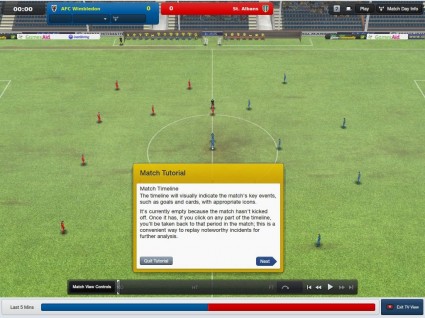
Always helpful
Creating your in-game personality is another simple task, where you fill in the basics like your name, nationality, date of birth, favourite club etc., and you can even add a profile picture from your PC, Mac or Laptop; in fact it’s not dissimilar to joining our forums. In addition to these basic fields there is an area to add your past experience, with the default assuming you have never played football. Options here are Sunday League, Semi-Professional, Professional or International Footballer, and these settings will affect your game experience. For example, if you take up the option to start the game unemployed you will get a post far quicker and/or higher up the ladder if your experience is that of a past International.
Similarly you will feel the pressure quicker if you are less experienced, or at a club that is maybe a rival of your selected “favourite club”, as fans and Chairman find it more difficult to take to you. It’s a nice little touch that adds some variety to the game and can also act as an added difficulty setting should you want it to.
The nuts and bolts of Football Manager 2012, as with real life, come in the detailed preparation between games. This version, like its predecessors, gives you the ability to scout any player from the obscure, out of contract journeyman or unwanted kids to the world-famous superstars. It allows you to tinker with training regimes and set your coaches to specific schedules, and give individual players individual programmes to improve specific areas of their game, and it’s hugely rewarding to see those improvements. You can play with formations and tactics to your heart’s content and you will spend hours and hours and hours looking through transfer lists, trying to work out who to spend your budget on to improve your squad.
One of my favourite and most annoying features comes in the form of the staff meetings. Once a month or so, your number two will send a message to hold a staff meeting and then all your coaches will offer an opinion on the players they think you should sign, as well as those in the club that should be given specific training routines or playing instructions. It’s intuitive at its best and you can often stumble across a player you would never have thought of through this, especially if you’re playing as a lower league team or in a foreign country. At its worst though, it is a total waste of time, as coaches will advise you to tell a full back to switch play as often as possible or a forward to never use his weaker foot, while your scout will recommend quite possibly the worst player on the planet.
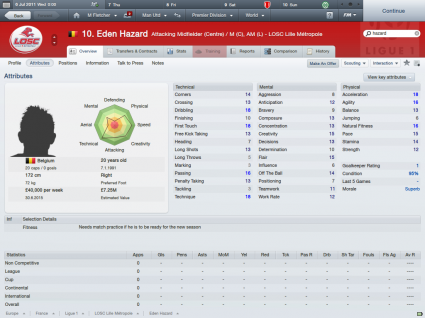
This is what quality looks like
As well as staff meetings you can also call a team meeting to air any issues or try and build morale if things are going badly, or alternatively, give the squad a collective pat on the back if things are going well. In addition you can have chats with players and staff individually to pick their brains on any one of a number of subjects, and all this helps to immerse you in the world and give you the feeling of being the “Gaffer”.
This continues as you go into matches, as you have all the pre-match build up screens with analysis of the players on both sides; pre-game press conferences where you’ll get pushed on your line up and tactics; and then the pre-match team talk, which has more tones of voice and more comments than ever, to try and get your views across and get your boys playing the way you want.
In-game you have a vast array of tactical options to use that start at a top level of your style of play, such as defensive or attacking, and below that, numerous little options such as pass to feet or pass into space, retain possession, stand off your opponents etc.; there truly is a mass of options available.
After the game there will be another press conference which you are always entitled to send your assistant to in your place, and again the press will do their best to get a story out of you about a dodgy refereeing decision, or an individual’s performance. If you contradict a statement made a few weeks earlier, they will remember and quiz you even more.
As with the pre-game ones they add an element of depth and realism to proceedings, and they can get a bit repetitive at times, as you get the same four or five questions every two or three games.
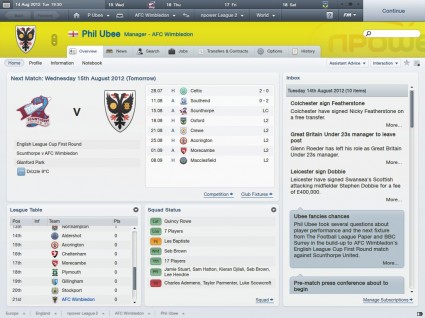
Glorious stats
The final element to whether you will be a success or failure is your board of directors. They will set your budget and your salary, and they ultimately will decide if you stay in a job or not. Throughout the game you can go to your board with various requests to develop the stadium or the training facilities, for example, and also set up affiliations with other clubs, either as a parent or feeder.
These relationships can make or break your club, but can take some persuasion to get the board to agree too. In my game as AFC Wimbledon I asked the board to find a parent club which would enable me to get players on loan for no fee, and get a bit of extra money in with a lucrative pre-season friendly. In addition some clubs will pay the smaller club a retainer in these situations, and the downside is simply that they get first dibs on your promising players when the time comes for them to move on. It took me three attempts to get them to agree, and even then I had to push.
As with everything in Football Manager, there is a balancing act here as you push your Chairman to get what you want. If you and your board don’t see eye to eye and you push too hard, you could end up accelerating your own departure.
He ran his socks off
As ever with a game of this type, the graphics really are not a key part of the package. Don’t get me wrong; Football Manager 2012 is extremely well-presented from top to bottom, and the menus are created as well, if not better than most modern-day websites. By that I mean that nothing is ever more than a couple of clicks away, either via drop-down menus, a right-click of links or even some rather handy keyboard shortcuts, making it look and feel incredibly user-friendly from start to finish.

Not quite FIFA
In addition, club badges and kits are well represented throughout, with menus taking a colour code from the club you manage, and there is a mug-shot of an absolute barrage of real-life players and coaches from across the globe to accompany their profiles. Alongside these are what look like E-FIT style computer-generated images of additional players that come into the game as the years go by.
The only area of the game that involves any kind of animation is the 3D match engine when the games roll around, and despite still being fairly basic by today’s standards, it is more than adequate. Thankfully, however, even on my most basic of laptops the only time I experienced any kind of framerate issue was when I ramped the speed of the highlights up to a point it was hurting my eyes to watch.
Players are quite small and still have a relatively blocky 16-bit kind of appearance, and the stadiums themselves (along with the supporters in them) are also quite basic to look at. The numbers in the stands do change in line with your actual attendance which is a nice touch, and the action is easy to follow in any of the views available, giving you a good idea of where you are winning or losing the game.
The crowd goes wild!
The sound is another area that isn’t really key to a title of this genre. In fact, the only sound the game offers is during a match where you will hear the referee’s whistle and a thud when a player strikes the ball. There is also a cheer from the fans when goals are scored (or nearly scored), which just about follow the action.
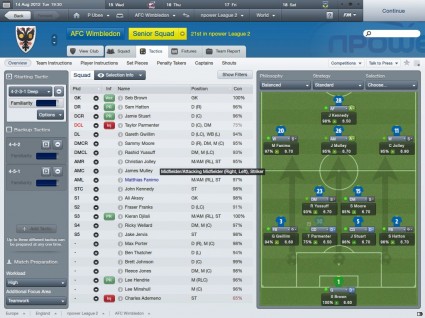
The team tactics is where you earn your pay check
In a way I was slightly surprised that in this day and age there was no menu music at all, but when playing on your PC or laptop all your digital music files are only a click away, so why waste processing power on a few tunes everyone will turn off in a few weeks?
It’s a team game
As is always the case with Football Manager titles there is an option to add as many managers into a game as you want, so that you and your friends can sit around the same machine taking it in turns. This is now a very dated (and in my opinion, unwelcome) option, as it slows the game down and leaves you inactive for potentially long periods, as each player searches for new signings, looks at scout reports, sets training schedules, picks their team for an upcoming fixture and reads their messages before clicking continue.
In addition to this though, we now have Network games. These can take the form of either Local Area or Wide Area (Internet) based. Obviously in this form games are quicker, there is less inactive time and you still get the interaction with other human managers.
However, setting up these Network games is not the easiest thing I’ve come across in gaming. Firstly there are no “Random” games or “Quick Matches”, so you can only join a game that you have the specific details of. In a LAN situation a search will show any available games on your network so students, for example, may find things easier, but you’ll probably still need a password to join in, which you’ll only get from the host.
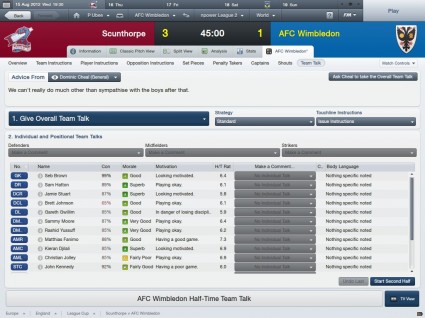
When it's all going wrong, throw a tea-cup
For most of us, Network games will mean the Internet, and you can’t search for available network games from within the Football Manager title. Instead you need to go to their community website http://community.sigames.com/ and look through the various threads, find a game, introduce yourself, get an invite and the info, then go back to your game and enter the details.
Obviously this can take a while to get yourself involved (in my case three weeks), and as such I haven’t had long enough with a Network game to pass fair comment in this review, but I will be posting in the comments in a few weeks time once I’ve had that opportunity.
League Champion or relegation fodder?
Football Manager 2012 gives you more depth than ever. The menus are beautifully simple to navigate, and the game is incredibly easy to pick up whilst being hugely involving and complex to master. The rewards within it are fulfilling to the point you will cheer when you get the big cup upset, and scream when you get turned over by a title rival.
Let’s be totally honest though; if you are not a football fan you will positively hate Football Manager 2012. Even if you are, you may well already know that you won’t be getting much enjoyment from this. However, there will be plenty of you reading this that are as eager as ever to get your fill of the life of a football manager, and for you I will simply say…
Platforms: PC | Tagged championship manager, Football, football manager, PC, Sega, si games, sports interactive, Steam



